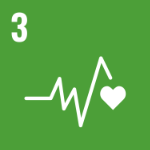

3. Good health and well-being
Incentives of Community Health Agents in Guinea-Bissau
Community Health Agents (CHA) programs are becoming increasingly popular in sub-Saharan Africa. In recent years, community health workers have become an essential part of national and international health strategies on the delivery of health care in the region. At the same time, there is a concern that the low motivation of CHAs may threaten the potential benefits of investing in CHA programs.
This study wants to investigate to what extent a model in which non-financial incentives are offered on top of basic monetary benefits can result in a sustainable and effective system to incentivize CHAs in developing countries. First, we study incentives activating the agents' intrinsic motivation, related to the pro-social characteristics of the CHA role and non-monetary rewards targeting the extrinsic motivation of the agents, such as social recognition in the community. Second, this study wants to test whether the dissemination of information on CHAs’ work in targeted communities could improve the program's effectiveness. Finally, we will also devote attention to the possible complementarity between the different non-financial incentive schemes and the complementarity between incentive schemes and more informed beneficiaries.
Principal Investigators:
Pedro Vicente (Nova SBE)
Teresa Molina (Nova SBE)
Mattia Fracchia (Nova SBE)
Field Coordination:
Melisa Rodrigues
Implementing Organization:
ONG VIDA
This content was originally published in Novafrica.org.

